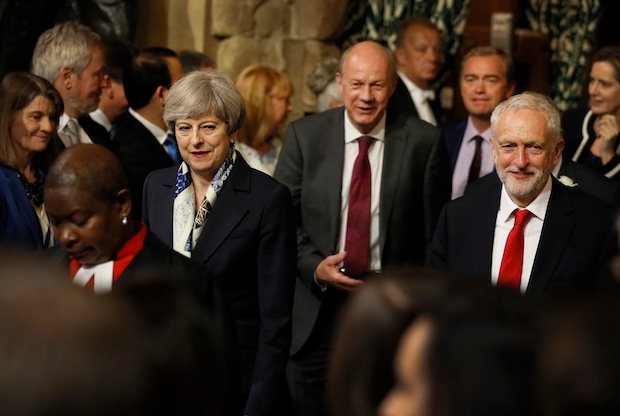Party leaders are meeting this afternoon to discuss Westminster’s response to the sexual harassment allegations sweeping all parts of the political spectrum. Ahead of the meeting, Jeremy Corbyn has called for a training programme for MPs after every general election on how to treat their employees, while Theresa May has said that parliament itself needs a ‘proper process where people can make complaints and bring allegations’.
Corbyn’s training idea makes a fair bit of sense. MPs are not elected based on their ability to run a small business, but that is effectively what they have to do with their staff in Parliament and in the constituency. When they arrive in Westminster, they are given inductions by the House and by their party whips, but this doesn’t include much in the way of training on any aspect of how to be a good parliamentarian, whether it be the lofty business of scrutinising legislation, or the basics of managing staff. Most of them spend a good few months trying to work out what on earth is going on.
Over the past few weeks as the allegations have emerged, Westminster has split into two camps. These camps transcend party divisions: one is made up of those who are furious about the harassment allegations and see the revelations as a belated chance to change the culture in politics, while the second consists of those who think the allegations have moved from the serious to a witch hunt and a societal shift that involves people being unable to flirt with one another. The first camp may be guilty of trial by social media, dragging the name of anyone named on any kind of ‘dossier’ into the mud, whether or not the allegations against them involve any real impropriety or just a relationship between two coworkers. But the second camp is at risk of minimising the connection between ‘low-level’ incidents and the more serious problems that they too claim to take seriously. It is an odd state of affairs when whether or not you can make a pass at someone becomes more of a preoccupation than how on earth rape allegations are still being covered up.
But what’s even odder is the way that all levels of harassment have been minimised and normalised in Westminster to the extent that a number of accounts of improper behaviour have included quotes along these lines:
‘It just became common knowledge around the office for the female press officers to be a bit careful, to avoid him. And if they were away on overnight visits with him to be really careful, try to avoid being one-on-one in a non-open space. Senior press officers had started briefing junior members of staff on how to avoid him, keep away from him. It became known that if a press officer started she’d be briefed to keep away from him.’
That’s from Buzzfeed’s account of allegations against Ivan Lewis (he strenuously denies having sexually harassed anyone but says ‘I understand that a few women have claimed my behaviour made them feel uncomfortable’ and has apologised for that). But the description, of women being told basically to work around someone’s inappropriate behaviour, is so common in Westminster that it has become unremarkable. Surely even those who claim this scandal will just make life more difficult for women because men won’t want to employ them or because they won’t be able to have sex ever again after terrifying men about consent have to acknowledge that it’s not as if things are that great for junior women in politics at the moment, either.
But it may well be the case that we have ended up electing a handful of parliamentarians who genuinely cannot tell the difference between flirting and inappropriate behaviour, in which case a few training sessions on how not to harass your staffer, or not accidentally grope another MP, might be quite useful. Other MPs who have been aware probably since puberty that this stuff isn’t OK would still appreciate basic HR training on how to manage an office, anyway, as many of them turn up in Parliament having never done such a thing before.
It would also help those two camps of people in Westminster see eye to eye a little more: the first camp can argue to the second camp that they no longer need to be so worried that the human race is going to die out as a result of the end to a culture of inappropriate behaviour in Westminster, while the second camp can tell the first that there is now no need for unsubstantiated allegations to be aired on social media because there is genuinely a properly confidential process that will actually take allegations seriously rather than store them up as information to be used advantageously later, or merely give the alleged perpetrator a little telling off before promoting him. The row so far has been as ugly as it has been because the two camps are making too much noise to realise that very few people disagree on the core point, which is that people shouldn’t be able to get away with wrongdoing, no matter how powerful they happen to be.








Comments